When the federal government passed the Higher Education Act (HEA) in 1965, politicians acknowledged an obvious fact: pursuing a college education can be difficult. The act’s federal grants and loan programs lessened financial barriers for students from low-income and minority backgrounds, yet hurdles remain that can make becoming the first in one’s family to attend college a daunting task.
The First-Generation College Celebration (Nov. 8) celebrates the HEA’s passage—and the determination of all students who choose to pursue advanced degrees. Countless first-gen students now call the Case Western Reserve University campus home, with many looking to the student organization First CWRU for help navigating the college experience. They may also seek guidance from many staff, faculty and administrators who were the first in their families to pursue higher education.
The Daily sat down with eight members of the university community to hear their firsthand accounts and advice for today’s first-gen students. Read on to learn their insights.
Answers have been lightly edited for length.
Eric W. Kaler, president of Case Western Reserve University
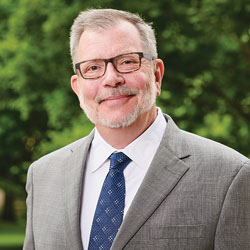
Eric Kaler’s childhood took him cross country—from Vermont to New Mexico, with a few stops in between. But it was an innate curiosity his parents helped fuel in him and an intense drive to succeed that set him on his path in academia. He went on to earn his bachelor’s in chemical engineering from California Institute of Technology (Caltech) and his PhD in the field from University of Minnesota—where he’d eventually return as its president before coming to Case Western Reserve.
What inspired you to pursue a college education?
Although my parents did not have the chance to go to college, they were intensely curious and constantly were learning. There was very little TV-watching in my house. My mother was always reading—usually a big volume of a biography— and my father was either reading or taking correspondence courses to train for a job after the Air Force. So there was really never the idea that I would not go to college.
What was the biggest challenge you encountered as a first-gen student and how did you overcome it?
My challenge was not so much as a first-gen student. Several of my friends also came from working class non-college families, so we just figured out how to do what we needed to do. The barrier I had was a woefully inadequate preparation for the intensity of Caltech. Many of my classmates came from private schools or high-level public schools in Chicago or New York. So it took me a full two years to become academically competitive. But I did.
Why do you feel it’s important to pursue college even if your family members have not?
There is nothing that can enable a full and successful life as much as a college degree. It opens doors, gives life experiences, and sets you on a path to a productive and fulfilling career.
What advice would you give today’s first-gen students?
You can’t always control what you know, or who you are competing with, but you can control how hard you work and how smartly you allocate that work to the challenges you have. Everyone gets 24 hours in a day. Think hard about how you use them.
Kianna Sabrina Verdugo, president of First CWRU
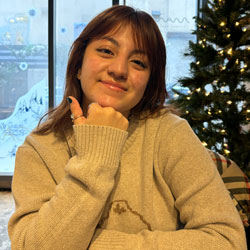
Hailing from El Paso, Texas, Kianna Sabrina Verdugo is a third-year biomedical engineering student on the pre-medicine track with minors in creative writing and polymer science engineering. Her favorite thing about CWRU is the amount of organizations she’s been able to explore; she’s a residential assistant in Clarke Tower, president of First CWRU, and an active member of La Alianza, oSTEM, and the Women’s Coalition.
What inspired you to pursue a college education?
My biggest inspiration was my parents and being able to hand them my cap and gown once I graduate. I want to show my brother it is possible to receive this type of education and support him as he goes through his education soon after me.
What was the biggest challenge you encountered as a first-gen student and how did you overcome it?
My biggest challenge was getting adjusted to imposter syndrome as I made my way through my major. It was difficult trying to prove myself in such a demanding major and trying to be perfect and make no mistakes. I realized that I had to utilize my resources and battle negative thinking that I still work on today.
Why do you feel it’s important to pursue college even if your family members have not?
Higher education is something I want to share with my family and be able to show them that their sacrifices were worth it; while they may not have college educations, we can share this diploma together.
What advice would you give today’s first-gen students?
Your best is what matters—there is no correct college experience and asking for help is not a sign of weakness. You are not only defined by a grade but also what you involve yourself in and how you keep growing as a person.
Janée Kelly, director of the Office of Multicultural Affairs
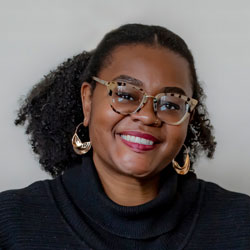
As director of the Office of Multicultural Affairs, Janée Kelly is focused on developing an inclusive community that supports all students, respects and celebrates their identities, and facilitates their success. The Akron native brings a unique perspective to her role, having been first in her family to attend college. She earned her bachelor’s at Miami University, master’s at Kent State University, and is now a fourth-year PhD student in the CWRU Department of Anthropology.
What inspired you to pursue a college education?
College felt like the clearest path to success and elevating my socioeconomic status. In my community, there were major limitations on where I could go professionally without a degree. Also, I’ve always enjoyed learning and being in the classroom. I consider myself a forever student.
What was the biggest challenge you encountered as a first-gen student and how did you overcome it?
I think the sheer overwhelm of being dropped off on a college campus was stressful and hard to wrap my mind around in my first year and led me to not succeed academically. It was my second year that I came back determined to utilize every resource I could find and look for the right questions to ask. I relied on my resilience to fuel my success.
Why do you feel it’s important to pursue college even if your family members have not?
I knew college would open doors that weren’t going to be open to me without a degree. Beyond that, I knew it was a goal I wanted to achieve since I was young, so I was determined to see it through. Even if no one in your family has attended college, it doesn’t hurt to be the first. It’s difficult, but I can honestly say it was more than worth it.
What advice would you give today’s first-gen students?
Rely on your first-gen community to find the resources you need to graduate! Oftentimes as first-gen students, we are intimidated by the fact that everyone else seems to be knowing what they’re doing, and it’s like we don’t. Well, after almost a decade working in higher education, I can tell you that many students don’t come in knowing exactly what to do. So lean into the unknown! Try new experiences, ask the question you might feel like you should already know the answer to, and find another first-gen friend to connect with. As long as you aren’t going through it alone, you will absolutely make it through. You belong here.
Cheon il Allado, first-year representative in First CWRU
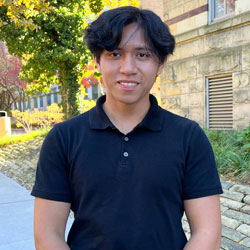
Originally from the Bronx, New York, Cheon il Allado is a first-year student intending to major in biochemistry. He is heavily involved across campus and beyond, including with First CWRU, Latino Medical Student Association, CWRU Juggling Club, CWRU Hospice Volunteering Club and the Lideres Avanzando program. Allado also volunteers at the Greater Cleveland Food Bank and works at the Jolly Scholar.
What inspired you to pursue a college education?
I was raised under the impression that college was my only means of reaching financial success. It was the ultimate dream for me, especially as a child who grew up with parents learning English. I witnessed the hardships that my parents faced amidst all the language and cultural barriers we faced in New York, which only inspired me to navigate through them all with higher education.
As I grew up, my priorities shifted from escaping poverty to building a legacy for my future family. My family may have financial hardships, but my parents were always loving and hardworking. I see college as a way to set a legacy for my future family, a sacrifice that I want to make in an attempt to match the sacrifices my parents made for me by immigrating to America.
What was the biggest challenge you encountered as a first-gen student and how did you overcome it?
I definitely faced imposter’s syndrome over if I belonged at college when some students outperformed me with less effort put into assignments. However, I use perspective to overcome that uneasy feeling. I understand that I didn’t have the resources to academically succeed at a young age and that I have a different set of tools to play around with. Once I tell myself that, I feel a lot more confident thinking, “Wow, I grew up with less and ended up at the same institution with people who had more.” That alone means that I belong.
Why do you feel it’s important to pursue college even if your family members have not?
I believe that I owe it to my future family to give them opportunities that I didn’t have access to. My parents did the same for me when they realized that their kids could pursue the American dream and have opportunities to receive an education.
What advice would you give today’s first-gen students?
Always remember that there is much more to you than grades and your class ranking. We all have the potential to move hearts and make big impacts in each other’s lives, so use your life stories and complex identities to your advantage.
Stephen Furlow-Munn, associate director of the Office of Multicultural Affairs
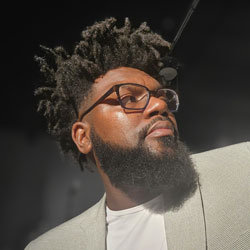
Though he was born in Boston, Stephen Furlow-Munn grew up nearby in Cleveland’s South East Side. A connector by nature, he facilitates community engagement and partnership across campus and Cleveland in his work with the OMA. Furlow-Munn earned his bachelor’s from Cleveland State University and his master’s from Northern Arizona University.
What inspired you to pursue a college education?
My mother and father were pivotal in influencing my decision to stay the course. I also watched a lot of great TV shows and movies that depicted college as the next step for bright young people who wanted a chance to become well rounded and aware. Shows like A Different World and The Fresh Prince of Bel-Air, and movies like School Daze gave unique perspectives with characters who mirrored aspects of my own upbringing.
What was the biggest challenge you encountered as a first-gen student and how did you overcome it?
Finding resources could sometimes be challenging, so I became unafraid of asking questions and exploring the space around me. I also learned that by getting involved within the campus community, people would present me with opportunities during moments of uncertainty; they recognized I was invested in my own success and wanted to see me achieve a goal.
Why do you feel it’s important to pursue college even if your family members have not?
College is not a measure of intelligence, it is a measure of resilience. You could learn these same lessons in a much less caring and supportive environment with a smaller financial investment. However, it will take you longer to make quality connections, while learning to look at life through a global lens and growing your social circle. Lastly, you may inspire the people who support you. My mother went back and got her degree and thanked me for the inspiration, then went and got her master’s before I did!
What advice would you give today’s first-gen students?
Never doubt your worthiness, and never tell yourself that you don’t fit! Puzzles make beautiful pictures because of all the unique pieces. You complete this puzzle, you just have to find your space!
Marvin Nieman, vice provost and dean of graduate studies
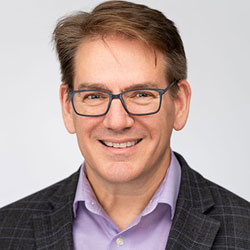
Growing up in Petersburg, Michigan, Marvin Nieman didn’t have a firm grasp on what a college experience might entail—but after pursuing higher education, he forged his career in the field. Nieman now serves as Case Western Reserve’s chief academic and administrative officer for the School of Graduate Studies where he promotes and supports excellence in teaching, research and creative activities. He holds a bachelor’s in biochemistry from Eastern Michigan University and a PhD in cell biology from University of Toledo.
What inspired you to pursue a college education?
It was expected that I would go to college. However, I did not have an understanding of what that meant or what to study. I did well in math and science so I was told engineering would be good for me. I changed my major after the first term.
What was the biggest challenge you encountered as a first-gen student and how did you overcome it?
The biggest challenge was figuring out the landscape and then how to navigate classes and studying. This was compounded by being a commuter student and not being immersed in the campus culture.
Why do you feel it’s important to pursue college even if your family members have not?
Going to college has provided me with opportunities that I didn’t know existed. I had no idea what a scientist actually did or even what biochemistry was when I started. The college experience allows you to discover new careers and meet people from diverse cultures from all over the world.
What advice would you give today’s first-gen students?
The best advice is that you belong here and there is a community that is here to help you succeed. Take advantage of the opportunities and organizations that are available to you.
Alexis Valdovinos, vice president of internal affairs for First CWRU
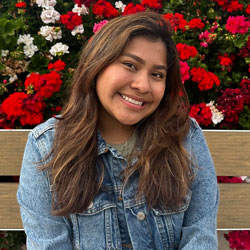
A senior accounting major from Waukegan, Illinois, Alexis Valdovinos has no shortage of extracurricular activities at CWRU. She’s a leader of First CWRU, member of the Undergraduate Diversity Collaborative’s Finance Committee and a Greenhouse Scholar. The community across campus is Valdovinos’ favorite part of CWRU, as she’s glad to be getting to know people from diverse backgrounds.
What inspired you to pursue a college education?
My family has always stressed the importance of education since it was not an experience they were able to obtain and it would open opportunities. Seeing their sacrifices and hard work in order to give me the opportunities for a good education instilled a sense of wanting to make the most out of my education. I realized that my family’s encouragement and support was a big part of why I wanted to pursue a career.
What was the biggest challenge you encountered as a first-gen student and how did you overcome it?
One of the biggest challenges was navigating an unfamiliar process and finding a sense of belonging. The feeling was highlighted when I would hear others talking about the experiences that they had because of their parents or college advice that they received from them. While some students knew that internships had to be applied for a year in advance or how to study for college classes, I felt behind since I didn’t have the same access to that type of knowledge or support.
Over time, I realized that the support that I had from my family was just as important as any other. They were there to remind me that I deserve to be here at CWRU as much as everyone else. And although they couldn’t give me any firsthand experience advice, I could count on
them for the love and support they had always given me which goes a long way. I joined First CWRU my freshman year where I got to meet so many people that share the same experiences that I did. Being part of this community helped me better navigate the college experience knowing that I was not alone and could count on others.
Why do you feel it’s important to pursue college even if your family members have not?
I believe education is important to open doors to new opportunities. Pursuing a higher education has given me experiences and opportunities that no one in my family has had before, whether that be access to professional networks or internships. With every new opportunity that I have been fortunate to have, I get to expand my own horizons but also expose my family to things they never knew were possible.
Just because my parents did not attend college doesn’t mean that they wanted me to follow in their steps. They made everything possible to get me here. I am now taking the opportunity to show my younger brother that something new is possible in the future. Hopefully, I have proven that there will be many obstacles in the way, but the foundation that I am setting up for my future will be worth it in the end.
What advice would you give today’s first-gen students?
My advice would be to take up space and own it. You have worked hard to get where you are and deserve to take advantage of every opportunity, even when it may not feel like it. Own the identity of being first-gen. Although it’s scary in a lot of ways , the path that you will create will be amazing in the long run.
Sabian Burke, vice president of external affairs for First CWRU
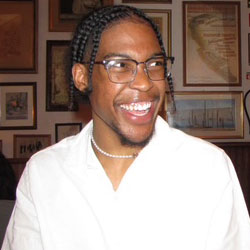
A member of the Class of 2025, Sabian Burke is majoring in business management with a concentration in entrepreneurship and organizational leadership—skills he also applies in his leadership role with First CWRU. In addition to his extracurriculars, the New Orleans native enjoys taking part in University Program Board’s fall and spring break raffle trips that offer opportunities to explore new places.
What inspired you to pursue a college education?
My sister inspired me to pursue a college education. I was always expected to just go to college, seeing as I was so good at school, but I was scared of the unknown until I saw my sister do it. This gave me the motivation that I needed to pursue higher education
What was the biggest challenge you encountered as a first-gen student and how did you overcome it?
The biggest challenge I faced was realizing how much I didn’t know. I constantly questioned myself—when should I apply for internships? What steps should I take to stand out in the job market? The uncertainty was overwhelming. But I overcame it by using the resources my school offered, like career center counseling, and by leaning on First CWRU as my support system to fill those gaps in knowledge.
Why do you feel it’s important to pursue college even if your family members have not?
College has granted me so many opportunities that I don’t think I would have ever gotten so early in my life, like the ability to travel to Italy for study abroad or the opportunity to take classes that teach me more than just textbook information but valuable soft skills and networking.
What advice would you give today’s first-gen students?
You learn a lot more when you lose than when you win. Don’t be defeated by your losses; learn from them and grow because that’s the only way you can become better.
